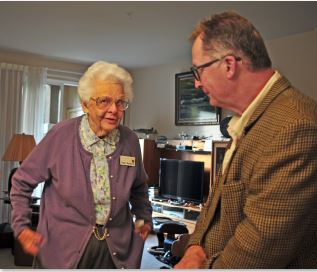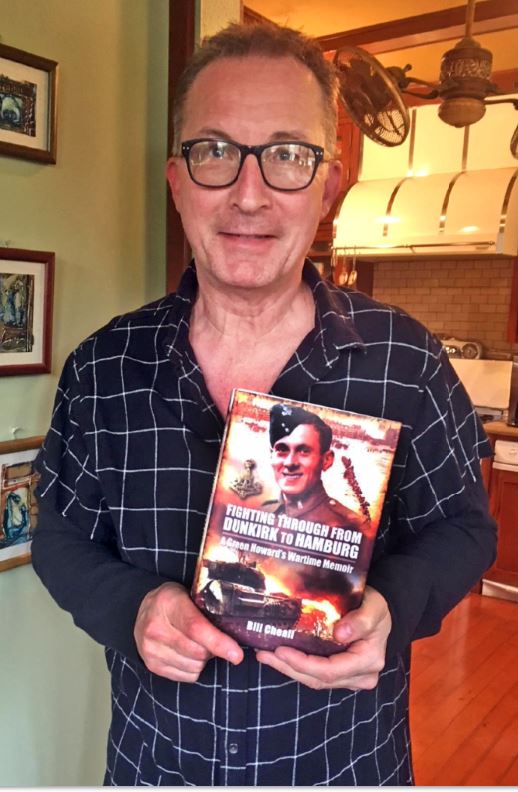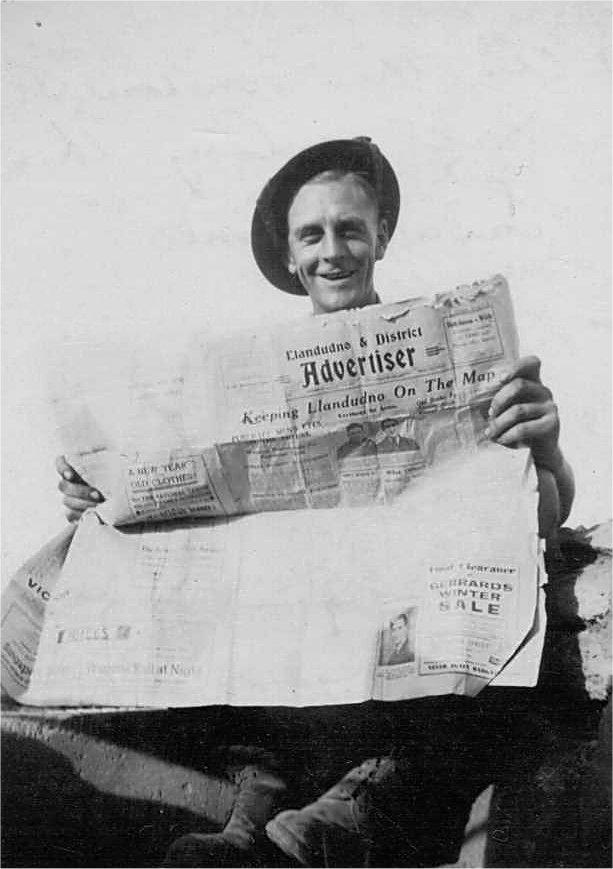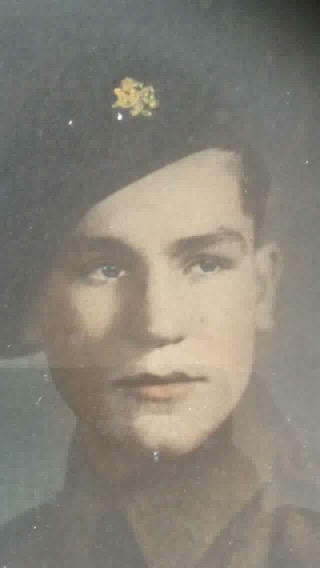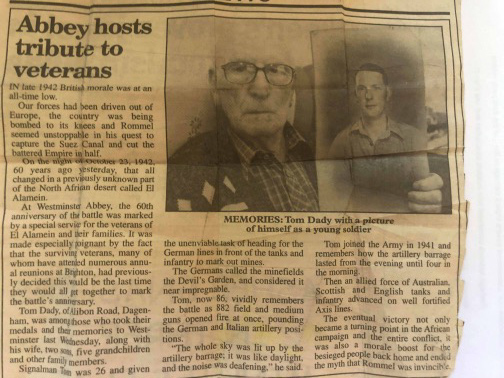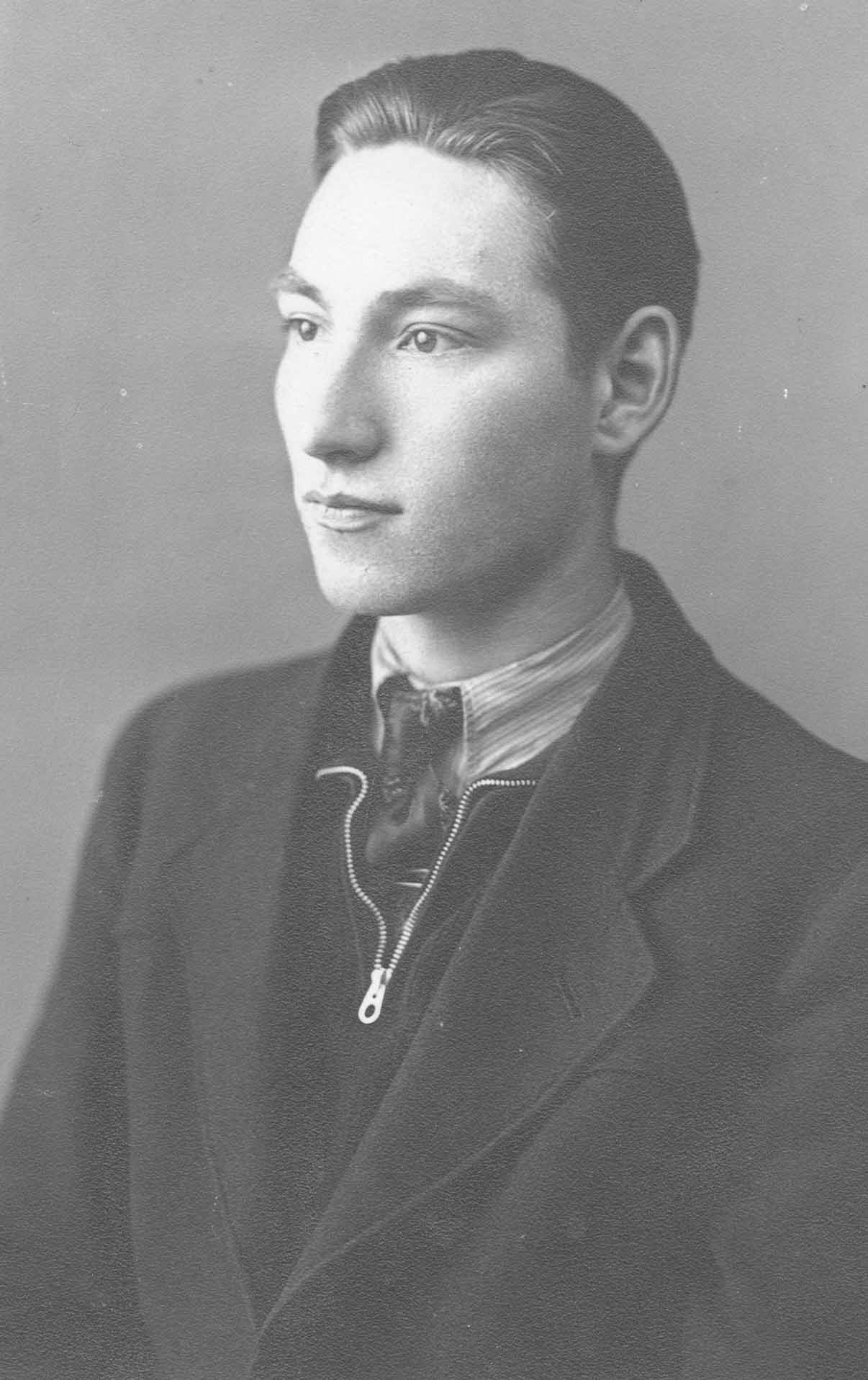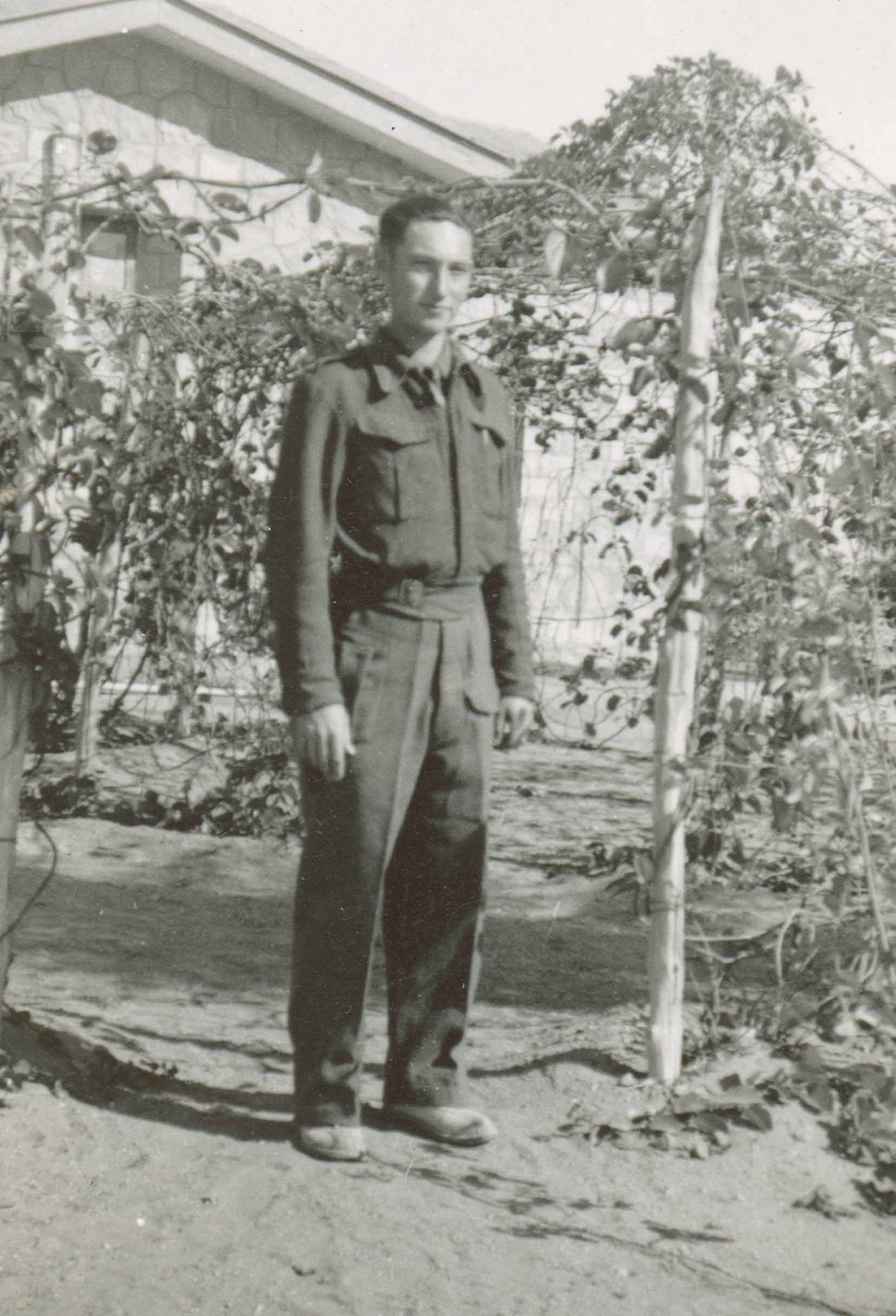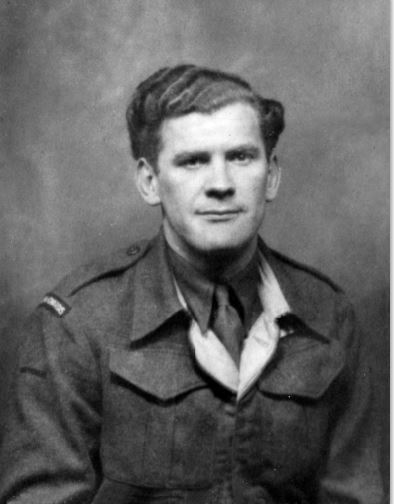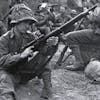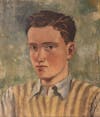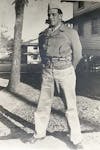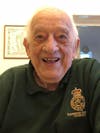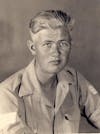29 Prisoner of War in WWII - Memoir by Brian Asquith
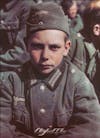
Memoirs of a British POW in WWII Poland, "Long Time, no WC"
The story of Brian Asquith, who was a Rifleman in the Kings Royal Rifle Corps and was captured at Dunkirk in 1940, WWII.
A dangerous but heart-warming adventure in war-time Poland. Learn how the Polish people and the human race come out on top despite deadly dealings by the Nazis.
Brian exposes intriguing POW secrets from five years in captivity in WW2 Poland. His memoir, Long Time No WC is captivating and entertaining and demonstrates how the Polish nation proudly and compassionately looked after our troops.
"Suddenly through the haze we saw a flight of 20 large planes in arrow formation at about 10,000 feet. As they came nearer we realised they were American Fortresses".
"We found a courtyard with steps leading to a cellar and decided this would be our hiding place, but we’d only been there for about half an hour when we heard footsteps in the yard and heard a loud voice say 'Englander, Aus'."
Plus:
A host of My Relative stories
More great unpublished history - of the Second World War.
Link to feedback/reviews at Apple Podcasts - Thank you.
Brian Asquith, author of POW memoir Long Time No WC.

This 13 yr old German boy was one of 60 members of the Hitler Youth captured by the 14th Armoured Division, 3rd US Army, in the vicinity of Martinszell-Waltenhofen, Germany on April 29, 1945. The group of youngsters ranged in age from 13-17 yrs old. US Army Signal Corps photo - PFC Joseph W. Lapine Colourised by: Colour by RJM

Colourised by: Colour by RJM
Best podcast for World War 2 history and the second world war
Interested in Bill Cheall's book? Link here for more information.
Fighting Through from Dunkirk to Hamburg, hardback, paperback and Kindle etc.
Brian Asquith was born in Halifax 1916 and won a scholarship to go Rishworth, a boy's school in Halifax. After leaving school he joined the King's Royal Rifles in 1937. He was discharged from the army in 1945 and six weeks later married and became a farm worker after discovering his love for animals while he was a POW. In 1966 he bought the village stores in Ellingham, Norfolk, England until retiring to Oakworth near Keighly in 1978. Jean Asquith died in 1992. Howeber, with Brian's positive attitude to life, he decided to write his own story, helped by letters written home to Jean during his captivity. His book was self-published and was called Long Time, No WC! No longer published, good copies can still be had on Amazon and Ebay.
Nancy Miller Livingston Stratford, aged 98 flew for the ATA (Air Transport Auxiliary) during WW2. Canadian Craig Renwick from Pasadena is researching her amazing story for a TV series.
Craig holds up his copy of my Dad's book. If you'd like a signed copy use the link far right.
Brian Willet uncovers an amazing stash of WWII Home Guard photos
Brian has sent me a selection from a recently discovered stash of 300 amazing and historic photos of the Home Guard training in Wales.
PLUS:
"The photo of Dad reading the local rag in the Western Desert was taken by a War photographer and was used by the Advertiser putting Dad on the front page, no photo of Dad reading a later edition with him on the cover was sadly ever taken!
"The colour picture of Mum and Dad was taken shortly before he died, he'd been out with me and my brother on Silver Jubilee Day and had had a 'grand' time. He was a good father but kept his service in the Army to himself.
I am the son of John and Marjorie Willitt and was born and lived in Llandudno, North Wales. Dad lived at 5 Mowbray Road from childhood till his early thirties. Like many people the Second World War took away six years of his life, he volunteered for duty because as one of five brothers they all qualified to be exempt from military service, they all were telephone engineers. Dad knew that his mother, a widow, was worried that neighbours whose sons had been called up would despise the Willitt family if all the sons were sitting out the War so he joined up and served in the Royal Corps of Signals in the Western Desert and later Germany.
In 2016 I was sent a FaceBook Message from a retired BT engineer Gwyn Hughes, the BT garage in Llandudno was being cleared before demolition and a box of negatives and prints had been found with paperwork addressed to Hector Willitt. Gwyn was given the task of contacting any living relatives and a FaceBook search found me, he did a great job transferring all photos onto a memory stick and sent it to me.
After downloading into my PC I was amazed as to what I had been sent. My Uncle Hector had pictured all aspects of training for the Home Guard and in many photos it appeared that Dad's eldest brother Arthur seemed to be one of those in charge!
It was relatively easy to spot where the training camp was located - before the War lots of Holiday Camps had sprung up along the North Wales coast and the one in the photos was in the village of Belgrano in between Abergele and Rhyl.
The tall man in the photos seems to be permanent staff at the Training ground, at a guess I'd say he's the Sergeant Major. Appears in lots of photos, I'd say you wouldn't want to cross him!! A search in a War Records site gives Dads eldest brother Arthur, who seems to be in charge at Belgrano, as rank of Major. When the Home Guard disbanded in 1944 he was then rank of Acting Lieutenant Colonel, Dad never mentioned that, it would have pissed him off big style! ha ha!!
Slide show to be inserted asap
Tom Dady recounts his WW2 Alamein experience. Plenty more in the podcast.
Tom Dady's news article about his WW2 Alamein experience
Alfred Decker from Bremen - German POW in WW2 Egypt
Alfred Decker, the German POW guarded by Bill Cheall in Egypt early1943. Dad showed him a lot of kindness and sent a letter home to his parents to tell them he was safe. His mother sent Dad her only photograph of her son.
Alfred Decker - German POW 1943 in British battle dress
Doug Charlton, 6 Green Howards
FT Podcast - Episode 29 – Prisoner of War WW2
More great unpublished history!
Hello again
I’m Paul Cheall, son of Bill Cheall whose WW2 memoirs have been published by Pen and Sword – in FTFDTH.
The aim of these podcasts is to give you the stories behind the story. You’ll hear memoirs and memories of veterans connected to Dad’s war in some way – and much more. Thank you so very much for listening – I do appreciate it.
This is going to be a real miscellany of a show. I’ve got all sorts in it. I have a absolute stack of Listener feedback and “My Relative was in the war” memoirs. My star feature is a fantastic POW memoir I dug up at a car boot sale or I think you call them garage sales in America.
It’s about a British POW in Poland and how he survived the war to tell the tale, in no small part due to kindnesses offered by the Polish people. Plus there’s a few other POW anecdotes I’ve come across which you’ll hear in the postscript, the PS. So there’s going to be some pretty compelling listening.
I think it might be my longest show ever – massive in fact. I hope that’s OK. We’ll see … it’s a bit of an experiment and I hope it’s sufficiently immersive for you.
Wilf Shaw funeral, WW2 veteran
I’m still sad after the death of veteran Wilf Shaw a few weeks ago at the age of 98 and I’m now going to give you news of how his funeral went and what a great sending off he was given by his family, friends and military connections.
So, firstly, some great feedback from Lesley Littlewood about Wilf’s funeral. For anyone listening to the show for the first time, Wilf has featured several times in previous episodes and the Coffee with Wilf series was definitely a favourite for many listeners. Here’s Lesley:
Wilf's funeral was held recently and I’m pleased to say it was a beautiful service and he had a really lovely send-off
The service at St. Paul's Church was really dignified, at times very emotional and well attended. There were members of Oldham Royal British Legion in church with a Standard Bearer. There was a representative from the Green Howards Regiment, Bernard Bunting of Leeds, who read the tribute to Wilf, written by Paul Cheall (with some lovely words included by our very own Steve Mac from the WW2Talk forum). The Last Post was played.
Four members of staff from the Marks and Spencer's store at Ashton Moss came to the funeral too, which was a really nice tribute to Wilf, as he’d been visiting the café for quite a few years and the staff knew him well. A few people from the sheltered accommodation where Wilf lived were there, members of his extended family, and a few members of the public who’d turned up to offer their condolences.
Wilf's family invited us back to their home for food and drinks and it was lovely to finally meet Wilf's son and daughter-in-law, Michael and Elaine, as well as his grandsons, Leon and David. My husband, Steve and I were made to feel really welcome and it was a pleasure to talk to them about my memories and wonderful times I shared with Wilf.
Lesley
A couple of flashbacks to the last episode:
A shout out for a new podcast – in my last show I was exhorting you to take care of the birds during the cold weather and afterwards I felt I could have mentioned the casual birder podcast by Suzy Buttress. Suzy’s a great host and really gets you interested in the birds in your garden, so if you get bored with war stories one day, tune into the Casual Birder Podcast for a change, available on all podcast players. There’s absolutely no connection between the Fighting Through Podcast and the Casual Birder so I hope you’ll forgive me there, but I did say this show was going to be a real miscellany.
A mystery is solved, regarding where a certain soldier was wounded, leading to his death. I want to briefly re-visit something from a recent episode about veterans Wilf Shaw and Fred Zilken. You might recall Fred mentioning the army service numbers which had been allocated between him and Wilf and wondering what happened to the three guys in question. We know two survived but one, Alfred Taylor, died 23 May 1945, aged 26, which was just days after the war in Europe had ended, on 8 May. We were puzzled as to how this had come about.
Well, the answer, as it turns out, was pretty obvious because when I looked up the number on the CWGC web site it showed that he’s buried at STREATHAM CEMETERY in London.
Well that means he was probably wounded fighting in Europe and evacuated to England, only to then die in hospital. If he’d been out in the far east, he’d probably have been buried there. So what a tragedy to be wounded during the last fighting to take place in Europe, and then to die back on your own shores. But I guess that would have happened a lot in reality.
FEEDBACK
1 Joshua Craig email
Hi Paul! I'm Joshua Craig, a college student from the US writing a fictitious WW2 book about two soldiers, one Italian and one American, who end up killing each other. Half of this book will be in English and the other half will be in Italian. The primary content will be letters written to people back home and journal entries.
In doing research for this project I came across your podcast, and I have been thoroughly enjoying all the episodes, including the ones unrelated to my project. Your readings of the memoirs and letters have been able to paint incredibly vivid pictures about the specific battles concerned.
Joshua thanks for that feedback – your project sounds fascinating and best of luck with it. If you get published let me know and I’ll give you a shout out on the show.
2 A comment from a listener about WW2 veteran troublemaker and troubleshooter Wilf Shaw RIP, whose exploits I commemorated in the previous show …
“28 days - for impersonating an officer?! That makes me smile. My dad was involved in similar shenanigans - but he was the driver while his mate, who could do a better posh accent, sat in the back of the car dressed in the officer's coat, hat & gloves which had been very thoughtfully left behind by the previous occupant. DBF in ww2talk.com forum
Listener at this point I’d like to give another big shout out, or in the UK we call it a plug, which also happens to be the thing we use to stop the water running out of the bathtub. But I believe the Yanks call that a stopper. The Brits think a stopper is something else, such as a gob stopper which is a great round boiled sweet that kids eat … so it goes on folks … you heard it here first!
Anyway, back to the shout out – it’s for a great online war forum called WW2Talk and anyone like Greg who is researching their family history can go there and meet up with like-minded folk, sometimes genuine war veterans.
I’ve used it a lot researching Dad’s WWII book and I met the late Wilf Shaw there, so you know that the knowledge of some of these folk is encyclopaedic.
There are sections for the various theatres of war and often for different battalions, even for war diaries or letters. Post a query and hopefully someone will pop up with some assistance before long. So – that’s WW2 Talk.com. I’ll put a link in the show notes.
3 This is feedback I’ve received from Steve Mac in the WW2 Talk.com forum and I’m using it partly cos it’s interesting and partly because it kind of illustrates the knowledge that’s floating around in this forum.
It’s now over 6.5 hours since I listened to your last Wilf podcast and something Wilf said in one of the clips resonates more than I expected it would – it was about what he felt was the worst action he’d been in.
Generally speaking, the 50 Div regarded Mareth (Operation Pugilist), Wadi Akarit (Operation Scipio) and Primosole (Operation Fustian, Sicily) as the hardest scraps they were in. We know that Wilf missed Mareth due to him recovering from a prior wound; and Primosole was mainly a 151st Infantry Brigade action.
Wadi Akarit was hell for Wilf’s the 69th InfantryBrigade
(5th East Yorkshire Regiment, & 6th & 7th Green Howards)
and I expected him to say that this was his worst experience in WWII. But he didn’t, he said the 2nd Battle of El Alamein (Operation Lightfoot) was the worst and the one he didn’t know how he survived (and nearly didn’t).
I was wounded in my left foot during the Rommel advance at “Knightsbridge June 1942
If I remember rightly you were wounded 3 times Wilf - once at Alamein, in the arm on Oct 24th '42.
Did he ever explain why it was the worst to you? I was just thinking it might be worth a reference?!
Steve, pretty much everything Wilf has told me is in the podcasts, so I’m not 100% sure why he found Alamein the worst. But here’s his description of the Alamein experience that I’ve pulled from his written memoirs and which I’m currently working on for a future podcast or maybe an audio book:
My feelings, bearing in mind what had happened previously at Gazala, and in the most appropriate phrase I can think of, were "fatalistic resignation". I just couldn't see how I was going to get through it without serious injury or worse, which I didn't, but, thank God, I didn't lose a limb. I am not ashamed to say I was scared as hell, I was part of a section of 8 or 9 who advanced towards dug-in Italians with Bredas, no more than 40 or 50 yards away.
They opened up as we advanced and hit most of us, I hit the deck and jammed the rim of my steel helmet into the ground, it was an action that surely saved my life because a bullet smashed straight into it. It broke through the steel and dropped on the inside of the camouflage net which covered my helmet.
I was on the right extremity of the advancing section, the lad on my left had been hit around his mouth and neck and was in a bit of a state.
An officer leading us gave the order to charge forward. I did and threw hand grenades and we overran the enemy positions. I ended up in an enemy trench on top of a dead Italian. There was only the officer and myself who managed to get that far. I think if I was hearing this from anyone else I would find it hard to believe.
It was the following day when I got hit when doing the same thing in broad daylight and this time it was shellfire and, of all the places to get a shell splinter, it was beneath my left armpit. It penetrated almost, but not quite through to the front, no bones hit or no blood vessels, which I think is remarkable considering all the blood vessels there are there.
Steve I think that probably explains why Wilf found it such hard going. He came so close to death in a very scary encounter.
I know he was heavily shelled at Akarit and there was some pretty nasty fighting but
maybe he found that only slightly less concerning
depending exactly where he was positioned, I’m thinking of the Italian trench he once had to dive in which had been used as a latrine, so instead of landing on top of a dead Italian he landed on something else! But at least in that position he was under relatively safe cover!
….
More misc Feedback
Many thanks to Mr Mark N4CC from USA and martin North who both wrote in with nice feedback. Thank you chaps.
- Excellent and enjoyable - Mr Mark N4CC from USA on April 2, 2018
Every episode is exceptional. The interviews are excellent but I think the readings are even better, Paul captures the essence of every subject and situation. Mark
- I first read this book two years ago, now it joins me on holiday, in Northern France, so close to so many fallen. About to start the second read.
Martin North, Facebook.
6 Jonnym57 – UK - March 15, 2018
Big shout out for anyone listening to the show while they’re driving, namely JonnyM57 from UK:
“I’ve only just discovered podcasts, where have I been?
I have always been fascinated by ww2 and this series of podcasts has been amazing. I’ve never been chilled to the bone so often, the stories are so thrilling and your Dad’s exploits have me hooked. I often listen while driving my truck and it makes the miles fly past. Thank you and keep up the good work.
And as well as Jonny listening to the show while he’s driving, there’s also been
Craig Murray Renwick from California has sent me a great story about researching people who delivered aeroplanes during the war.
Craig said:
Hi Paul....WOW!!!! The podcast (I know I'm catching up) on Gallipoli was amazing and relentless. What a tale was told and you told it so well. I stumbled upon your podcasts and absolutely LOVED hearing them and I wanted to reach out to tell you myself.
Living in southern California, I’m faced daily with horrendous commuting traffic and my ride from my house in South Pasadena to the west side of Los Angeles is roughly 20 miles but some days it can take 90 minutes! So I need to entertain myself and TRY to keep my sanity.
I work for 20th C Fox on their studio lot. In my non work hours I’m writing a 10 part TV series based on the lives of the 168 women from all around the world that flew for the ATA (Air Transport Auxiliary) during WW2.
I’ve done a ton of research on these ladies (and men of course) and even managed to find the last of the American pilots living a couple hours south of me in Carlsbad, CA.
She’s Nancy Miller Livingston Stratford, aged 98 but moves around like she is so much younger. Even though her hearing is bad I managed to spend 3 hours interviewing her whilst she showed me her log books, scrapbook full of images and other artefacts around her apartment. I’ve been obsessed with their story - and how amazing that they flew delivering fighters and bombers with no radio, little or no instrument training and flying by sight in UK weather.
Anyway…in continuing to search for more “thoughts and experiences” of that time I keep searching on line and found your podcast. Let me tell you from the first episode I was hooked! These “human” stories captivated me and I will need to order a copy of your book.
You’ve done a fine job of putting together the stories of these brave people who are fading away so very fast.
I will be 60 this August and my father John and his brother David both were in the 48th Highlanders of Canada. On my mother’s side she had three brothers that served in Europe and came back. I attach a newspaper clipping that was saved of her brothers.
So I’ve grown up with these brave men who volunteered to help save our freedoms. You’re doing a wonderful job Paul and I really have enjoyed the web site with the extra videos and images. Thanks for all you are doing.
Craig thanks for writing in with that fascinating insight into your work. If you get your TV series off the ground do let me know and I’ll give you a big plug on the show! Good luck with it. And for anyone who wants to see a selfie of Craig holding up Dad’s book – take a quick shufty at the FTP.co.uk home page or feedback tab.
My Relative
Before I start this section I must apologise for how long it’s taken to pull these together into the show but I’ve had quite a few contributions in the recent past and it does take a while to sort through them and get them ready. But I do love hearing from everyone so don’t let that put you off writing. Anyway. Here’s some fascinating My Relative emails from listeners … Where photos etc have been mentioned, you’ll find them all in the show notes.
1 Bill Burnett - 1 year ago YouTube – re Coffee with Wilf
Bill’s got a story about his relative who was a POW with the Italians …
Thanks for a wonderful piece of oral history - it's so important that such things are recorded and preserved for future generations. My father-in-law was a member of 6th Bn Green Howards and had many tales to tell. Unfortunately nobody thought to record them or write them down before he died.
He was Doug CHARLTON, 'C' Company of 6th Bn Green Howards and having returned home safely after 'Dunkirk' he re-joined his battalion and spent several months back home involved in defensive work.
In July 41 the battalion was sent to Egypt and from there moved first to Cyprus, then to Iraq, Syria and finally to the Tobruck area in Libya, February 42. (I wonder if he knew Wilf Shaw or Fred Zilken!)
He was captured in an action after the fall of Tobruck and was among the POW's who were handed over to the Italians and transported to the Italian mainland. Doug spent some time in a camp in southern Italy before being transferred to a camp near Turin in northern Italy.
He escaped from there the day after the Italian Armistice and made his way into the mountains north of Turin where he was taken in by a family who had a farm near Caffasse. He remained there for several months and made contact with the Italian Partisans. He was on his way to meet a group of them … when he was recaptured by German soldiers!
He was sent to a transit camp at Trieste before being taken to Stalag VII-A at Moosberg in Bavaria and remained there until the camp was liberated by American forces in 1945.
The family name of BURNETT in Yorkshire is my main genealogy interest and I was interested in the Ronnie BURNETT you mentioned on your web site. I'm afraid I can't identify him positively but it is possible, that he was the man of that name who became captain of Yorkshire County Cricket Club in the late 1950's. Bill
2 Greg Weydert – with two very sport at war stories !
Hi from Central illinois in the USA. I love the series. My grandfather served in the US Army Air Corp loading bombers in North Africa. He never did talk much about his duties or much about this period at all. He shared two stories over his entire experience:
- During the weekend in North Africa his crew went golfing and he never golfed before. Well at the end of the round people asked how he did and he was wondering if two holes-in-one was good.
No one talked to him for a week after that. Well from then on he was hooked as a golfer and taught his family all the way to great grandkids the love of the game, He was also able to add on some championship trophies and few more holes-in-one to his legend.
- He and his brother got stuck on a slow ship home from Japan at the end of the war. A boat full of soldiers with pockets full of army back pay and nothing else to do but play cards. He and his brother came off the boat with enough money to open up their own bar.
The book is a great read, I’ve been showing it off to the patrons in my library and I’m creating a list of people who want to read it after me. What I like about both the podcast and the book is I get to see the war from a different point of view.
Although my Grandpa never talked about the war it did not stop me from researching it and getting sucked into it. However I know a lot about the Americans and their part. I love to hear what the other allied forces did.
Keep up the great work
Greg Weydert
Moving on … more My Relative stuff …WW2 WWII
3 Brian Willit has sent me a superb photo of an engraved tankard of the war story together with news of his discovery of a hidden horde of wartime photos of his local home guard volunteers…
Hi Paul, discovered your podcast last week and enjoyed the first few episodes. Like your Dad my father also served in the Western Desert from the beginning to the end of the campaign.
I’m the son of John and Marjorie Willitt and was born and lived in Llandudno, North Wales. Dad lived at 5 Mowbray Road from childhood till his early thirties.
Like for many people, the Second World War took away six years of his life. He volunteered for duty because he was one of five brothers who all qualified to be exempt from military service, they all were telephone engineers.
Dad knew that his mother, a widow, was worried that neighbours whose sons had been called up would despise the Willitt family if all the sons were sitting out the war, so he joined up and served in the Royal Corps of Signals in the Western Desert and later Germany.
Dad was at some time was attached to the 51st Highland Div. He was not very forthcoming about his war - the only thing that could be learned about his service was a hatred of Montgomery for some reason!
Anyway, I thought you might like these photos of one of his souvenirs. I have few tangible things of my father and like this the best!
Listener, Brian’s sent me a photo of a tankard engraved with various scenes from his Dad’s war battles – quite superb – Brian suggested it would was made from a shell casing.
We lost our father in 1981, too many crap cigarettes in Alexandria! Shame the internet didn't start twenty years earlier - so many stories lost forever now.
Two years ago I was contacted by a local historian who worked for British Telecom. Staff at one of their Telephone Exchanges had found a sealed box with my Uncle's name on the lid. He had opened it and found over three hundred photos taken by my Uncle Hector of the Home Guard training in North Wales circa 1940 and in many photos it appeared that Dad's eldest brother Arthur seemed to be one of those in charge!
The photos are pin sharp and cover marching, camouflage, camps by a firing range and instruction on various weaponry. Before the War lots of Holiday Camps had sprung up along the North Wales coast and the one in the photos was in the village of Belgrano in between Abergele and Rhyl.
We’re planning a trip soon to film what is there now. I'm going to visit because apparently target posts are still visible!
There’s a photo of Dad reading the local rag in the Western Desert. It was taken by a War photographer and was used by the Advertiser newspaper, putting Dad on the front page,
No photo of Dad reading a later edition with him on the cover was sadly ever taken. (haha!)
Being Welsh it’s rugby for me this afternoon!!
All the Best. Brian
Brian thanks so much for all this. I’ve posted those historic photos you sent in the show notes and of course you have many more. I know you were wondering who would be interested in these and I’d say there’d certainly be historians who would be very keen to see them. If anyone listening to this wants to know more, get in touch with me and I’ll connect you to Brian. As for the Rugby, give me American Football any day!!!
4 John Dady, email – John’s written in about his family’s seven-a-side soccer team and another POW link, together with how a hunting party took unfair advantage of a boar using a piece of military hardware that meant it was well, just not playing cricket …
Hi Paul
I’m an avid listener of your podcast and I read your dads book, I couldn’t put it down.
Listening to the Wilf Shaw tribute reminded me of listening to my dad and uncles talking about the war.
They only told us of the funny parts and wouldn’t go into detail about what they had seen. They served in all the theatres except the Far East and were very lucky that out of 7 of them … only one was badly wounded, in Italy.
Alas they are all gone now and I would have loved to have had them write down their stories before they went.
The family was originally from Stepney East London but got bombed out in the blitz and moved to Dagenham.
My dad was in the Irish guards for the last month of the war in Germany, then after a year there he went to Palestine.
My uncles were in the Royal Fusilliers, Essex regt, Middlesex regt, Royal Berkshire regt, Royal Engineers, South Wales Borderers and one in the Royal Navy. So you can see that they were all over the place.
It’s a real shame that more stories never got told. My grandad was in the 1st World war from 1915 to when he was captured in March 1917, wounded twice and suffered from PTSD his whole life . To us kids he was our mad grandad, but we know better now don’t we!
Your dad’s experience in Germany was really interesting. My Dad told me how they had to stop the Russian POWs running rampage over the villages, and a funny story about going wild boar hunting with the officers who were armed with shotguns only. When they got charged by a boar they couldn’t stop it so …. my dad fired all 30 rounds from his Bren gun into it, much to the officer’s disgust!
I’m very proud of my family’s contributions and my cousins and myself are trying to do research into them all.
Here’s my dad, granddad and uncles medals from both wars and a photo of my dad as a young guardsman in Germany in 1945.
Keep up the good work and I cannot wait for the next episode
Cheers
John Dady
John thanks you so much for those great tales and good luck with your family research. I’d wholeheartedly encourage you with it as it’ll be a fantastic legacy to your entire family for generations to come.
In some ways it’s never been easier to research family histories and now is the time to record every little anecdote and action that you can because right now some of us still have half a chance to get this stuff from the horse’s mouth. So do it, and get your youngsters involved. But I’ll warn you it can be addictive because the more you learn the more you want to learn. But I truly believe that your descendants will be reading your story in 500 years’ time. How good would that be?! And how proud would they be to learn of the mettle from which they were descended!
Anyway here endeth today’s sermon!
Just a final comment on the photo of John’s Dad, I’ve noticed that with all these war photos, how much older these boys look than they really are. Even the ones of my own Dad still look like my Dad rather the young lad he really was. And I think it just echoes something Dad said in his memoirs, that: “Soldiers of the Second World War were a rare breed of men. Boys of nineteen quickly became stout-hearted men of great calibre, who fought without fear for survival against a ruthless enemy”
And listener, given all we’ve listened to in these episodes, how true is that?
5 Mark Mullins now introduces his father in law, who was also once a POW in Korea and tells us about the quite sinister military role he still plays today:
My Father in Law is Obie Wickersham, 307 combat engineers, 504 Division, 82 Airborne.
He fought from Anzio in Italy to Berlin. I’m very happy to still have him but at 94 he’s starting to fade a bit.
I’m fortunate enough to be traveling with him to the “82 All American Week” this May. Obie is the last living 307 Engineer to make the Waal River Crossing in operation Market Garden. The Engineers were tasked with bringing the boats back across the river for more troops and Obie survived 5 trips across the river before joining up with his group. On one of his trips a comrade was shot dead right next to him.
He was later called up to Korea and spent 28 months as a POW with the Chinese; they were force marched from Korea to China losing one third of their numbers on the march alone.
Beale Air Force Base is formally the home of the SR71 and currently the U-2 spy plane. Twice a year they invite Obie out to give Airmen (spy plane pilots) a lecture on POW survival and dealing with torture. He won’t discuss this particular lecture, it’s only for those who may find themselves captured and under duress.
Obie has just turned 94 and is doing well.
Thanks for all you have done for some very special veterans.
Mark Mullins, Ord Bend, CA
Mark thanks for your kind comments and you’ve sent in several pics all of which will go in the show notes together with photos of all Obie’s medals, including Silver Star, Bronze Star and 3 Purple Hearts! My goodness Obie you should have met Wilf when he was alive, you could have compared scars and stories!
Mark, you have a stack of other material about Obie which space doesn’t permit right now but I hope we can get something together for a future episode. Bye for now and a very special best wishes to Obie from me and no doubt every one of over 2000 listeners to the show and growing.
If anyone wants to help make it 2001, I’d be grateful if you could post a rating or review sometime in Apple Podcasts or your favourite player. Or follow me on Facebook. There are links and everything at www.fightingthrough podcast.co.uk
START
On Dad’s Names I will Always Remember list, there are three soldiers in particular, Captain Kidd, Captain Foster and Lieut Farrand, all of whom were taken prisoner at Gravelines during the Dunkirk battles in 1940. I have absolutely no knowledge of what became of them except Dad noted that Captain Foster died in 1988.
Regarding Capt Kidd in particular, I’ve no trace of him, no photos or anything apart from a reasonably prominent mention in major Petch’s memoir which is Episode 9 of this podcast. He’d just had a young baby he’d possibly never seen when he had to go to France, so it would have been a long 6 years before he saw him or her again – how sad is that. If there’s anyone listening who can complete any of the gaps in their stories, I really would love to hear from a relative of Captain Kidd, Captain Foster or Lieut Farrand.
I’ll remind you now that I have a couple more POW stories to follow this, both of them very poignant and instructive, so please do hang on to the PS.
WW2 WWII podcast
But maybe this is the sort of adventure that the captured Capt Kidd and comrades had ...
I picked up a small self-published paperback of his story in a car boot sale and I’ve tried no end of times to contact people connected with its publication without success. So I’m nevertheless going to use some of his story for this podcast.
The reason is that I know from Dad’s book that any publicity is good publicity and anything I can offer in that direction through this podcast can only be a good thing if the family ever decided to broaden the book’s publication.
It’s a fantastic story about a British soldier who is captured in 1940 during the fighting at Dunkirk. He ends up as a POW in German-occupied Poland.
The story is funny and heart-warming, though not without some sadness, but overall I do think the human race comes out on top.
And the Polish people come out in a very favourable light for showing some Dunkirk spirit of their own in showing various kindnesses to the POW’s, despite being oppressed themselves.
It’s a reminder of European togetherness even in 1945 but I think it has something of interest to all nationalities.
This is the story of Brian Asquith, who was a Rifleman in the Kings Royal Rifle Corps and was captured at Dunkirk in 1940.
It’s called “Long time, no WC”
Please excuse any noise of pages turning but on this occasion I am reading directly from the book. If you guys are driving at the moment, make sure you keep an eye on the road. For the rest of you, relax and enjoy a good story.
The book has several dedications, one of which is Jean Asquith, Brian’s Wife. Then there’s the Polish Civilians who risked their own lives to give what little they had
And finally, Lieutenant Robert Scott: P iii
It’s May 10 1940, Germany has invaded Holland. The British braced themselves for heavy action and my Dad with Major Petch and his boys were already over in France …
Telegram
Ordered back to unit. Rayleigh Essex.
He moved out on 12 May
BOOK
Listener we’re coming towards the end of Brian’s adventures although there are several more scary moments before he does manage to get back safely to England. How will he do it? How much will he have to pay for a pint of beer and will his girlfriend still be waiting for him? To find out you’ll just have to buy the book!
At this point I just want to take a second to warn you to stay for the ritual PS at the end of this podcast, where you’re going to hear two more short POW stories – Will a young German grenadier be shot by his British captors – and how will my Dad, Bill Cheall, react when he has to guard German prisoners captured at Alamein, one of whom could easily have put the bullet through Wilf Shaw’s helmet?
But before that, here’s just a few brief words from Brian to draw his story to a conclusion.
What a great memoir that was. So Captains Kidd, Foster and Lieut Farrand, Dad’s comrades who were captured at Dunkirk, I have no idea if you ended up in Poland but if anyone knows please do get in touch. If you did end up in Poland then what a fantastic history your family have now got to read in Brian Asquith’s book
That was extracts from Brian Asquith’s self-published book, Long Time No WC. I found it in a car boot sale a few years ago now. Little did I realise how much precious history was in it. I’ve read it three times now and I’m sure I’ll read it again some time. But when I got it it was being sold new by Brian’s son-in-law I think it was. And blow me, you can actually get it on Amazon and Ebay second hand for a few quid. I’d highly recommend it and I’ll put a link in the show notes.
If you, listener, are connected with the family or this book, please do get in touch through the website www.fightingthroughpodcast.co.uk
which, as always, has social media, links, photos and show notes.
If you get a chance, please follow me on Facebook.
If you have any memories, anecdotes or even recordings of your relative’s war stories, do get in touch. I’m working on all sorts of subject matters at the moment including women at war, Victoria Crosses, Ships, especially the Queen Mary, several others but it doesn’t matter what niche a story might fit into, let me know about it. Maybe you’re Polish and have relatives who were affected by the war? And I’ve got another Dunkirk episode
Whilst I’m talking about memoirs, I’ve just put a limited quantity of Dad’s book on Amazon. It’s Fighting Through from Dunkirk to Hamburg and is effectively the glue that pulls so many of these podcast episodes together. It’s hardback, signed by me, and I’ll throw in a few souvenir photographs from the book and the podcast for good measure. I’m putting a special link in the show notes. If you order one and want a special greeting written in, just say if possible or drop me an email.
Thank you so much for being here. As much fun as it is doing this show, I could not keep it up without the support you give me. Thank you to all the people who wrote in already to contribute to the show – I can’t believe how much stuff I was sent this time around. And a special shout out for Richard Molloy (Colour by RJM) who provided the fantastic colourised photo of a German POW in my shownotes:
13 yr old German boy was one of 60 members of the Hitler Youth captured by the 14th Armoured Division, 3rd US Army, in the vicinity of Martinszell-Waltenhofen, Germany on April 29, 1945. The group of youngsters ranged in age from 13-17 yrs old.
US Army Signal Corps photo - Joseph W. Lapine
Colourised by Colour by RJM
If you want to see any more great colour war photos, check out Richard’s Facebook page, Colour by RJM. He does commissions so if you have a black/white photo you’d like colourised, that’s one option for you.
You’ve been listening to the Fighting Through podcast episode 29 – POW. It’s been a really long show this time and I hope that’s been OK. If it worked for you or otherwise, drop me a line.
But please do hear me next time!
Here’s the PS, and do keep listening because there’s plenty of it …
Brian Moss and the Bocage
If you’re a regular listener, you’ll already have heard of Royal Engineers Sgt Brian Moss’s many gripping escapades - London Blitz, Africa, D-Day. Well this clip is about the Normandy Campaign when his unit are up to their knees in the notorious French Bocage, fighting their way across the country as part of the 50th British Infantry Division, summer 1944.
“50 Div did not meet real resistance until they met reconnaissance units of 12 SS Panzer on 8th June at Audrieu and Cristot, and that is where the real fighting in Normandy began. 12 SS had a long way to go from their holding positions and raced forward at the highest speed. It is true to say that the allied advance stopped wherever British or Canadian units met 12 SS. In fact, the fanatical youngsters of 12 SS, who would prove themselves the best infantry to serve in Normandy, pushed back the Canadian units.
However, by the time 50 Div. were brought to a halt, they had entered the Bocage, that dense close country which made advance by any army a very costly business. If we had met 12 SS within a mile of the beach, that would have been the end of it all, for there would have been no space in which to deploy our artillery, the weapon that would destroy the Panzers.
We stayed in a field at Sommervieu for 36 hours, and were then rushed forward to where my platoon was put in the line as infantry. We held a ditch for 24 hours at the edge of a wood, looking down across fields at a hamlet occupied by 12 SS. Elements of 2nd Essex were holding the ground on our left. Spandau fire crashed through the branches above our heads.
We took one prisoner, a Panzer grenadier, and Billy Balfour sat him blindfolded upon the back of our carrier. He seemed certain he was going to be shot.
I filled my pint pot with tea and held it to his lips. He jerked back in panic. Then he realised what it was, and drank thirstily.
A tear came from under his blindfold, and rolled down his dust-covered cheek. Then he sobbed. He couldn't have been more than seventeen.
PPS
This is a truly heart-warming clip from Dad’s book about his time in Egypt in 1943 and it’s about how he took a German POW under his wing and the virtuous reward he received for doing so.
“For a while, we had to guard thousands of German prisoners of war, who had been taken at Alamein. They looked really exhausted and were almost all about the same age as us and wanted to be sociable; it was not their fault they were at war and they seemed very pleased to have been taken prisoner.
We would take out small working parties about the camp doing maintenance. Two of the young Germans in my party spoke very good English and were quite well educated, wanting to make conversation and I, rightly or wrongly, obliged. Their names were Helmut Beckermeyer and Alfred Decker, both from Bremen in northern Germany. They told me all about their families and homes, giving me their address. I formed the opinion that not all Germans were bad, the same as not all English are good, because I had come across some awful characters in my time in the army.
Granted, we were at war, but I felt that if I had been a prisoner of war I would have appreciated my guard showing me some kindness, so my favourable reaction to the young Germans was to give them little treats, like biscuits and chocolate. These were soldiers just like us – Wermarkt not SS.
Eventually, I wrote a letter to the parents of those boys, telling them that I had met their sons and that they were alive and well and happy to have been taken prisoner. Apparently, they had not known this news. The mother of Alfred Decker wrote back thanking me for my kindness and sent me their only photograph of Alfred. I still have the letter and snap among my souvenirs [aswell as a photo I took of Alfred dressed up in our battle dress]. God had been good to me and I felt I was upholding my faith by being kind to those lads, and I never regretted the action I took. The letter read as follows:
Dear Mr Cheall
I am glad I am finally able to thank you for what you have done for me. It was very kind of you to forward your son’s letter to me and thanks to you I learned he was alive and felt well. But unfortunately he did not know himself anything about our fate…. I am so happy he found in you a man who could understand him so well. Now he is asking me to send him a photo of his. You can imagine it is not easy to part with the only picture of my son that I have got, but since Alfred wrote me you have treated him as a comrade, I will fulfil his wish. I am hopeful that my son will soon be released and we shall see him again. Should you ever be in Bremen, you will always be welcome in my home.
Yours sincerely
Sender: Family W Borsinsky (Alfred Decker’s mother)
Bremen
Listener that’s the end of Dad’s official account of this episode in his war but I felt there was something left to explore, and that’s what happened to Alfred Decker? Did he survive the war and what happened to his family? I did some research a few years ago and tracked down a photo of Alfred’s grave on a German cemetery web site.
I used the Borsinsky family name and found a gravestone online with both that name and that of Alfred Decker – he died in 1998, just one year before my dad, at the age of 74.
After that the trail went cold, but it does seem like all turned out well for the Borsinsky family and Alfred. One day, I’d rather like to return to his family the only photograph that Alfred’s Mum had of him in 1943. But for now that action point is just an item on my to do list.
I have to say I experienced a degree of comfort when I read the bits in Brian Asquith’s memoir about the Wermarkt and the kindnesses they offered the POW’s. They didn’t know at the time but their acts of leniency were being repaid by my Dad on the other side of the globe.
I did a talk on Dad’s book at a local historical society in England a few years back and mentioned this story. After I’d finished a German lady came up to me to thank me and said she’d been very touched by my Dad’s kindness. How good is that?!
Ends
WW2 WWII podcast
Featured Episodes
If you're going to binge, best start at No 1, Dunkirk, the most popular episode of all. Welcome! Paul.
PS. Just swipe left to browse if you're on mobile.










